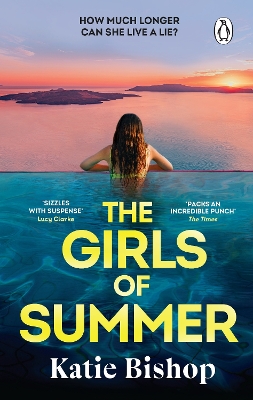Rachel has always remembered her first love, Alistair. Having met him on a Greek island while on a summer holiday with her best friend, he took over her world. So much so that she decided to stay in Greece with him, working at a local bar and living with many other girls. But things aren’t what they seem on that island, and Rachel returns to England to pick up the pieces of her life. Fifteen years later, she is married and has returned to that Greek island with her husband to relive her past. But as Rachel reconnects with her former housemates and Alistair, she starts remembering things she suppressed. She also slowly realizes that her time in Greece wasn’t as carefree as she tells people. Can Rachel shake off her past? Will she do the right thing when asked? Or will she continue defending the man who consumed her during that Greek summer?
I was drawn to the cover when I got invited to review The Girls of Summer. The white-bleached building with a view of the ocean was stunning. Then I read the blurb and knew I needed to read this book. I had followed the #MeToo movement with interest and also kinship. Because I, too, experienced sexual harassment at a job and, when reported, was told to keep my mouth shut (FYI: I told that HR person to shove it where the sun didn’t shine and immediately quit. My mother didn’t raise someone who dealt with that crap.) I figured that this book would be something like that. What I read, instead, was something that made me angry for those girls and what was done to them.
The Girls of Summer is a medium to fast-paced book. The pacing of the book suited the storyline. There was some lag towards the end of the book. I didn’t mind it because it was the end of the book.
The Girls of Summer takes place on an unnamed island in Greece during the “Then” part of the book. The “Now” part of the book takes place in London. Both places (Greece and London) have been my personal places to visit bucket list. I have wanted to visit since forever.
The main storyline of The Girls of Summer is split into two parts, “Now” and “Then,” and both parts follow Rachel. The “Now” parts of the book follow Rachel and the downward spiral in her life. The “Then” parts of the book follow Rachel and what happened in Greece. Both parts of the book were well-written and could keep my attention. I will admit that I wasn’t initially a fan of the split storyline. But as I read the book and got to know the characters, it worked, and I liked it.
Rachel wasn’t the book’s most likable or reliable narrator. She was mean to her husband. Who leads their husband on when he wants to have a baby and thinks it’s a fertility issue (fun fact, it wasn’t)? And as soon as she got Alistair’s number, she was back in bed with him. Her husband didn’t deserve that. And when she got together with Helena, Priya, and Agnes to discuss what happened fifteen years ago? She was a colossal jerk. I have never wanted to smack an adult more than I wanted to hit Rachel in the “Now” section. Rachel, in the “Then” section, I liked her better. She was naive and thought the best of everyone. Rachel was also head over heels in love with Alistair (gag) and would do anything for him.
I wasn’t sure if I should count Alistair as a main character. But, seeing how his actions and lies influenced the Rachel of the future, I decided to include him. I hated him. He knew what was happening in Harry’s house. He helped procure the girls for him. He disgusted me, and I was stunned when he and Rachel hooked back up. I will say that he got what he deserved at the end of the book.
The secondary characters and storylines add extra depth to the main characters and storylines.
The drama angle of the book was well written. The author wrote it so well and kept it classy. It never descended into catfights. Instead, the author wrapped it in Rachel’s angst and let it fly.
The mystery angle of the book consumed me. While I knew what would happen (I guessed reasonably early in the book), it still surprised me. I was also kept on pins and needles, wondering when Rachel would get her head out of her butt and remember that things weren’t perfect in Greece.
The end of The Girls of Summer seemed rushed. The author was able to wrap everything up in a way that satisfied me as a reader. I still wasn’t a fan of Rachel, but I liked seeing where she was after the dust settled.
I recommend The Girls of Summer to anyone over 21. There is language, sexual situations, and violence. Also, see my trigger warnings list.
Many thanks to St. Martin’s Press, NetGalley, and Katie Bishop for allowing me to read and review The Girls of Summer. All opinions expressed in this review are mine.
